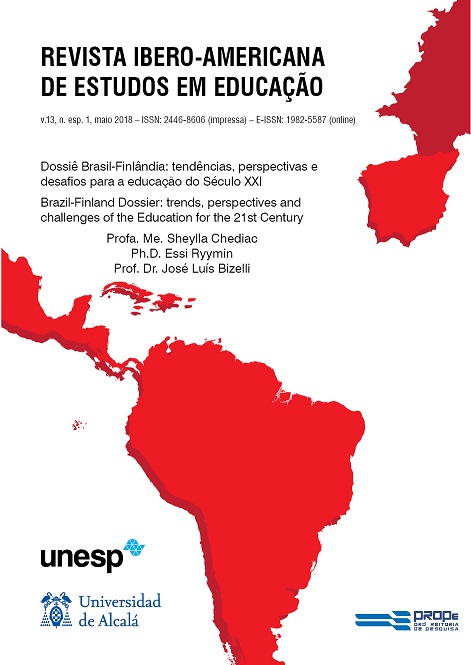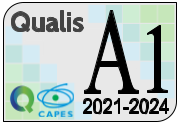Liderando a pesquisa e o desenvolvimento de inovações na educação
DOI:
https://doi.org/10.21723/riaee.nesp1.v13.2018.11413Palavras-chave:
Pesquisa, Desenvolvimento, Inovações, Formação de professores, Trabalho em equipe.Resumo
Neste artigo apresentamos e discutimos atividades de pesquisa e desenvolvimento global da Escola de Formação Profissional do Docente na Häme University of Applied Sciences na Finlândia. Também refletimos sobre os elementos chave no potencial de pesquisa e desenvolvimento de inovações educacionais em relação à formação de professores e parcerias internacionais.
Downloads
Referências
XXIst CENTURY SKILLS. In: ABBOTT, S. (Ed.) The Glossary of Education Reform. 2016.
BERNASCONI, A. University Entrepreneurship in a Developing Country: The Case of the P. Universidad Católica de Chile, 1985-2000. Higher Education, v. 50, n. 2, p. 247-274, 2005.
BRUSH, T.; SAYE, J. (Eds.) Special Issue on Technology-Supported Problem-Based Learning in Teacher Education. Interdisciplinary Journal of Problem-based Learning, v. 8, n. 1, p. 1-3, 2014. DOI:10.7771/1541-5015.1480.
CASSON, M. The Entrepreneur. An Economic Theory. Martin Robertson and Co. Ltd: Oxford, 1982.
CHENG, C.-Y.; CHUA, R. Y. J.; MORRIS, M. W.; LEE, L. Finding the right mix: How the composition of self-managing multicultural tams' cultural value orientation influences performance over time. Journal of Organizational Behavior, v. 33, n. 3, p. 389-411, 2012.
DURAN, R.; SUSIMETSÄ, M. A collaborative virtual classroom for game-based learning using immersive and free creative simulated universe in multiple scales. In: RYYMIN, E.; JOYCE, B.; LAURIKAINEN, M. (Eds.). The Future Makers – Professional Teachers Promoting Pedagogical Change. HAMKin julkaisuja 2/2016, HAMKin e-julkaisuja 4/2016, Hämeen ammattikorkeakoulu, 55-72. ISBN:978-951-784-780-3.
GIBB, A. Exploring the synergistic potential in entrepreneurial university development: towards the building of a strategic framework. Annals of Innovation and Entrepreneurship, n. 3, p. 1-24, 2012. DOI:10.3402/aie.v3i0.16742.
GIBB, A.; HASKINS, G.; HANNON, P.; Robertson, I. Leading the Entrepreneurial University. Meeting the entrepreneurial development needs of higher education institutions. Entrepreneurship in education: University of Oxford, 2012.
HAKKARAINEN, K.; PALONEN, T.; PAAVOLA, S.; LEHTINEN, E. Communities of networked expertise: Professional and educational perspectives. Amsterdam: Elsevier, 2004.
HOWELLS, J. Management and hybridization of expertise in network design. In: WILLIAMS, R.; FAULKNER, W.; FLECK, J. (Eds.). Exploring expertise: Issues and perspectives London: Macmillan, 1999. p. 265-285.
KAUFFELD, S. Self-dircted work groups and team competence. Journal of Occupational and Organizational Psychology, n. 79, p. 1-21, 2006.
KEAST, D. A. Entrepreneurship in Universities: Definitions, Practices, and Implications. Higher Education Quarterly, v. 49, n. 3, p. 248-266, 1995.
KUNNARI, I.; ILOMÄKI, L. Reframing teachers' work for educational innovation. Innovations in Education and Teaching International, 2014. DOI: 10.1080/14703297.2014.978351.
MAHLAMÄKI-KULTANEN, S.; JOYCE, B.; RYYMIN, E.; VISKARI, M; HEIKKILÄ, L. Brazilian VET teachers' strategies to transfer their learning in a Finnish-Brazilian teacher education programme. Journal of Finnish Universities of Applied Sciences, n. 3, 2015.
MELIN, G. et al. Towards a Future-proof System for Higher Education and Research for Finland. Ministry of Education and Culture, Helsinki, 2015. ISBN:978-952-263-349-1.
MINISTRY OF EDUCATION AND CULTURE OF FINLAND. A new Teacher Education Development Programme launched: Teachers’ competence must be developed methodically throughout their careers. Press Release 13th of October, 2016.
OECD. OECD Reviews of Innovation Policy: Finland 2017, OECD Publishing, Paris. DOI: 10.1787/9789264276369-en.
PENTTILÄ, T.; KAIRISTO-MERTANEN, L.; PUTKONEN, A.; LEHTO, A. Innovation pedagogy – a strategic learning approach for the future. In: LEHTO, A.; PENTTILÄ, T. (Eds.). Pedagogical views on innovation competences and entrepreneurship. Innovation pedagogy and other approaches. Reports from Turku University of Applied Sciences 171, 2013. p. 11-23.
REUVENI, Y.; VASHDI, D. Innovation in multidisciplinary teams: The moderating role of transformational leadership in the relationship between professional heterogeneity and shared mental models. European Journal of Work and Organizational Psychology, v. 24, n. 5, p. 678, 2015.
ROGERS, E. M.Diffusion of innovations (5th ed.). New York, NY: Free Press, 2003.
RUHALAHTI, S.; KORHONEN A.-M.; RASI, P. Authentic, dialogical knowledge construction: a blended and mobile teacher education programme. Educational Research, 2017. DOI: 10.1080/00131881.2017.1369858.
RYYMIN, E.; KUNNARI, I.; D’ANDREA, A. Digital Solutions in Teacher Education enhance Wellbeing and Expertise. Journal of Finnish Universities of Applied Sciences, n. 1, 2017.
RYYMIN, E.; KUNNARI, I.; JOYCE, B.; LAURIKAINEN, M. Networked Expertise Empowering Brazilian Teachers' Professional Development and Pedagogical Change. International Journal for Cross-Diciplinary subjects in Education, v.7, n. 2, p. 2755-2760, 2016. DOI: 10.20533/ijcdse.2042.6364.2016.0375.
SCHUMPETER, J. A. Theory of Economic Development. Cambridge Mass: Harvard University Press, 1934.
SMITH, K. Lessons learnt from literature on the diffusion of innovative learning and teaching practices in higher education. Innovations in Education & Teaching International, n. 49, p. 173-182, 2012.
THORNBURG, D. From the Campfire to the Holodeck: Creating Engaging and Powerful 21st Century Learning Environments. San Francisco: Joseey-Bass, 2014.
THORP, H.; GOLDSTEIN, B. Engines of Innovation: The Entrepreneurial University in the 21st Century. University of North Carolina Press, 2010.
WANG, C. X. V. Handbook of Research on Technologies for Improving the 21st Century Workforce: Tools for Lifelong Learning. Florida Atlantic University, Hershey PA: Information Science Reference IGI Global, 2012.
WELLS, G.; CLAXTON, G. Introduction: Sociocultural Perspectives on the Future of Education, in Learning for Life in the 21st Century. In: WELLS, G.; CLAXTON, G. (Eds.) Sociocultural Perspectives on the Future of Education, 2002. DOI: 10.1002/9780470753545.ch1.
Downloads
Publicado
Como Citar
Edição
Seção
Licença
Manuscritos aceitos e publicados são de propriedade dos autores com gestão da Ibero-American Journal of Studies in Education. É proibida a submissão total ou parcial do manuscrito a qualquer outro periódico. A responsabilidade pelo conteúdo dos artigos é exclusiva dos autores. A tradução para outro idioma é proibida sem a permissão por escrito do Editor ouvido pelo Comitê Editorial Científico.








